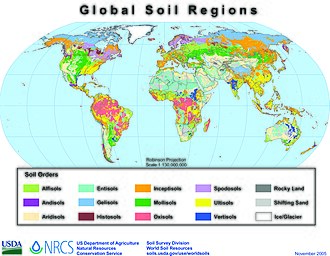Soil science


Soil Science is a critical and interdisciplinary field within the environmental sciences focusing on the study of soil as a natural resource on the surface of the Earth, including soil formation, classification, and mapping; physical, chemical, biological, and fertility properties of soils; and these properties in relation to the use and management of the soils.
Overview[edit]
Soil science is fundamental to understanding the environment, agriculture, and the sustainable management of natural resources. It encompasses various disciplines, including pedology (the study of soil formation, morphology, and classification), soil physics, soil chemistry, soil biology, and soil fertility. Soil scientists study the soil's physical properties (such as texture, structure, and porosity), chemical properties (including pH, cation exchange capacity, and nutrient content), and biological properties (such as the diversity and function of soil organisms).
Soil Formation and Classification[edit]
Soil formation is a complex process influenced by five main factors: parent material, climate, topography, biological factors, and time. These factors interact to form distinct soil layers, known as horizons, which are classified into different soil types based on their physical and chemical characteristics. The most widely used system for classifying soils is the Soil Taxonomy developed by the United States Department of Agriculture (USDA).
Soil Properties[edit]
Physical Properties[edit]
The physical properties of soil, including texture, structure, density, porosity, and water-holding capacity, affect water and air movement in the soil, root penetration, and seedling emergence. Soil texture, determined by the proportion of sand, silt, and clay, is a key factor in soil behavior and management.
Chemical Properties[edit]
Soil chemistry focuses on the chemical composition and properties of the soil, including pH, cation exchange capacity (CEC), and the presence of organic and inorganic substances. These properties influence nutrient availability, soil fertility, and plant growth.
Biological Properties[edit]
Soil biology examines the living component of the soil, including microorganisms (such as bacteria, fungi, and protozoa), earthworms, and other soil fauna. These organisms play crucial roles in nutrient cycling, organic matter decomposition, and soil structure formation.
Soil Fertility and Management[edit]
Soil fertility refers to the ability of soil to provide essential nutrients to plants in adequate amounts and proper proportions. Managing soil fertility involves practices such as the application of fertilizers and organic amendments, crop rotation, and conservation tillage to maintain or improve soil health and productivity.
Soil Conservation[edit]
Soil conservation is the prevention of soil loss from erosion or reduced fertility caused by overuse, acidification, salinization, or other chemical soil contamination. Practices such as contour plowing, terracing, cover cropping, and the establishment of windbreaks are employed to protect the soil from erosion and maintain its fertility.
Applications of Soil Science[edit]
Soil science has applications in agriculture, forestry, environmental management, and urban planning. It is essential for understanding and managing soil resources to ensure sustainable land use and agricultural productivity.
Ad. Transform your life with W8MD's Budget GLP-1 injections from $75


W8MD offers a medical weight loss program to lose weight in Philadelphia. Our physician-supervised medical weight loss provides:
- Weight loss injections in NYC (generic and brand names):
- Zepbound / Mounjaro, Wegovy / Ozempic, Saxenda
- Most insurances accepted or discounted self-pay rates. We will obtain insurance prior authorizations if needed.
- Generic GLP1 weight loss injections from $75 for the starting dose.
- Also offer prescription weight loss medications including Phentermine, Qsymia, Diethylpropion, Contrave etc.
NYC weight loss doctor appointmentsNYC weight loss doctor appointments
Start your NYC weight loss journey today at our NYC medical weight loss and Philadelphia medical weight loss clinics.
- Call 718-946-5500 to lose weight in NYC or for medical weight loss in Philadelphia 215-676-2334.
- Tags:NYC medical weight loss, Philadelphia lose weight Zepbound NYC, Budget GLP1 weight loss injections, Wegovy Philadelphia, Wegovy NYC, Philadelphia medical weight loss, Brookly weight loss and Wegovy NYC
|
WikiMD's Wellness Encyclopedia |
| Let Food Be Thy Medicine Medicine Thy Food - Hippocrates |
Medical Disclaimer: WikiMD is not a substitute for professional medical advice. The information on WikiMD is provided as an information resource only, may be incorrect, outdated or misleading, and is not to be used or relied on for any diagnostic or treatment purposes. Please consult your health care provider before making any healthcare decisions or for guidance about a specific medical condition. WikiMD expressly disclaims responsibility, and shall have no liability, for any damages, loss, injury, or liability whatsoever suffered as a result of your reliance on the information contained in this site. By visiting this site you agree to the foregoing terms and conditions, which may from time to time be changed or supplemented by WikiMD. If you do not agree to the foregoing terms and conditions, you should not enter or use this site. See full disclaimer.
Credits:Most images are courtesy of Wikimedia commons, and templates, categories Wikipedia, licensed under CC BY SA or similar.
Translate this page: - East Asian
中文,
日本,
한국어,
South Asian
हिन्दी,
தமிழ்,
తెలుగు,
Urdu,
ಕನ್ನಡ,
Southeast Asian
Indonesian,
Vietnamese,
Thai,
မြန်မာဘာသာ,
বাংলা
European
español,
Deutsch,
français,
Greek,
português do Brasil,
polski,
română,
русский,
Nederlands,
norsk,
svenska,
suomi,
Italian
Middle Eastern & African
عربى,
Turkish,
Persian,
Hebrew,
Afrikaans,
isiZulu,
Kiswahili,
Other
Bulgarian,
Hungarian,
Czech,
Swedish,
മലയാളം,
मराठी,
ਪੰਜਾਬੀ,
ગુજરાતી,
Portuguese,
Ukrainian
